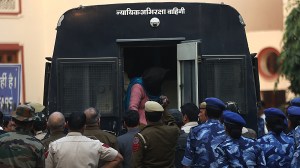Putin signs new military doctrine to first use’ N-arms
MOSCOW, APRIL 21: Keeping up its recent offensive to upstage Washington ahead of arms talks next week, Russia took two key steps on Friday...

MOSCOW, APRIL 21: Keeping up its recent offensive to upstage Washington ahead of arms talks next week, Russia took two key steps on Friday, radically influencing the strategic situation in today’s world.
President-elect Vladimir Putin signed Russia’s new military doctrine, after Russia’s all-powerful Security Council approved it at its emergency meeting in the Kremlin, even as the State Duma, Lower House of Parliament, started a debate on the ratification of the Comprehensive Test Ban Treaty (CTBT).
As the House met for the crucial decision on CTBT, the Communists led by Zyuganov demanded the ratification item to be removed from the agenda of the proceedings. But the House rejected it.
The House, which debated the issue in a closed-door session, passed the Ratification Bill with 298 in favour, 74 against and three abstentions.
Duma’s ratification of the CTBT came as another feather in the cap of Putin in as many days after he persuaded the Lower House to ratify START II treaty last week, something former President Boris Yeltsin failed to clinch.
It also provided additional handle to Putin as he was dispatching his Foreign Minister Igor Ivanov to Washington at the weekend, for talks on START III treaty.
Commenting on the ratification of the CTBT, Ivanov said, “We consider it a very important step. First of all, for the interest of Russia’s security, but also for the interest of world stability. Because the coming into force of this treaty, will be a serious barrier to the spread of nuclear weapons.”
As well as the ratification of START II and CTBT, the new military doctrine could be a useful ammunition for Russia in negotiations over the controversial American plan for a new national missile defence system, which Moscow strongly opposes, Russian television stations said.
The new military doctrine reserves the right for Russia to a “first use” of nuclear weapons in any situation it deems critical to its national security.
The doctrine, which reflects Putin’s vision of reviving Russia as a super power, has radically revised Russia’s defence doctrine, accepted in 1997 under Yeltsin, "while it doesn’t specifically name the United States or NATO as Russia’s attempts at gaining global monopoly, of gaining a position in the world,” said Alexey Arbatov, a famous strategic analyst and prominent member of the Russian Parliament.
In a video footage, Sergei Ivanov, secretary of the Security Council, dismissed the western criticism that the doctrine was “too confrontational”, saying the new military doctrine was defensive in character and was aimed at deterring the possible aggression against Russia.
“The text of the military doctrine meets the national interests of Russia,”he said.



- 01
- 02
- 03
- 04
- 05




























